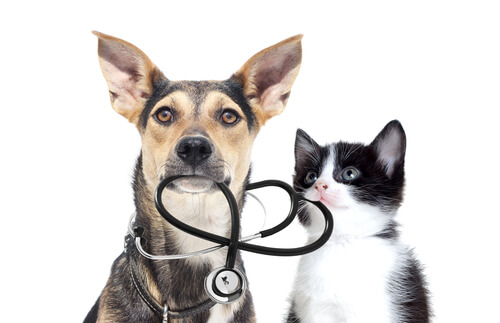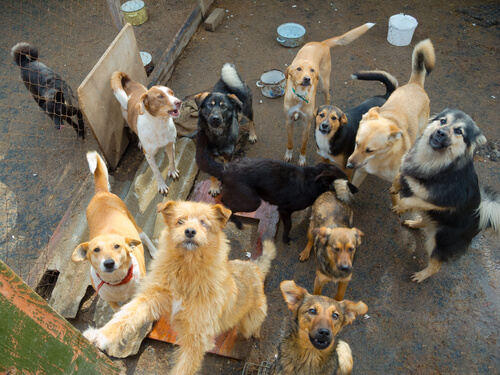What Is A Veterinarian Check-up Like For Your Pet?


Written and verified by the lawyer Francisco María García
Early diagnosis guarantees a simpler treatment, faster recovery, and will save on veterinary bills. This is why it’s really important not to forget to schedule an annual veterinarian check-up.
So, you might be wondering: What is a veterinarian check-up like? What happens during the appointment? In this article, you can find out the answer to these questions so you can be prepared to take your pet to the vet.
What is a veterinarian check-up like for your pet and what happens?
The first thing the vet will do is thoroughly check your pet from head to tail. The vet will examine your pet’s ear canals, teeth, and legs. Also, the vet will listen to your pet’s heartbeat by using a stethoscope and check your pet’s breathing.
Your pet’s vet will weigh and measure them and feel the glands around the neck, muscles, and abdomen to check for any lumps, signs of pain, or swelling. The vet will also check your pet’s temperature, attention levels, and observe the way they walk and sit.
Finally, the vet will check that their vaccination record is complete. If there are any signs or symptoms of a disease are found during this check, the vet will probably request to run a blood or urine test as well.

Sometimes, it may be necessary to fun an x-ray, ultrasound scan, or an ECG. Your vet will ask you specific questions during the check-up.
For example, you may be asked about your pet’s bowel movements or if there are any signs of unusual behaviors. This is the time you should be telling your pet’s vet about any doubts or concerns regarding your pet’s health.
How often should you schedule a veterinarian check-up for your pet?
You should take your pet to the vet several times during the first year their lives. You should schedule an appointment during the first few days after arriving at your home. A check-up for a puppy will include a complete examination to identify any possible congenital conditions. Your puppy will be given their first vaccines and the vet will plan the follow-up.
The vet will de-worm your pet and if necessary he or she will run a fecal analysis. Your vet will also give you advice on training and a proper diet according to your pet’s age.
With older animals, veterinary appointments should be more frequent after the age of ten years old. This is because, amongst other things, older dogs’ natural defenses start to drop, they become more vulnerable, and they need new vaccinations.
If your pet has come from a shelter or a pet shop, it’s probably best to run a thorough veterinarian check-up. These animals most likely have come into contact with many other animals and it’s best to get rid of any signs of possible disease they might have picked up.

In regard to adult pets that are current on their vaccinations, it’s a good idea to schedule a check-up once a year. However, if you notice any urinary problems, fatigue, digestion issues, or something bothering them, then get them checked by a vet as soon as possible.
How to prepare your pet for their veterinarian check-up
No pet likes going to the vet and any pet usually gets nervous. The first reason is due to them leaving a familiar environment. The second is due to seeing unfamiliar objects at the vet’s which may scare them.
Taking your animal to the vet can be very stressful, as much for your pet as it is for you. Therefore, you should use some form of transporter or carrier, especially if you have a cat.
If you have a dog, you should put him on a leash. This way you’ll be able to tie them up and prevent them from escaping or attacking other animals.
To try and calm your pet down, you need to keep calm yourself so your pet remains relaxed as well. Pets can notice when their owner is stressed or nervous. You should talk to your pet by using a firm but gentle voice. Petting them regularly is also very helpful.
Early diagnosis guarantees a simpler treatment, faster recovery, and will save on veterinary bills. This is why it’s really important not to forget to schedule an annual veterinarian check-up.
So, you might be wondering: What is a veterinarian check-up like? What happens during the appointment? In this article, you can find out the answer to these questions so you can be prepared to take your pet to the vet.
What is a veterinarian check-up like for your pet and what happens?
The first thing the vet will do is thoroughly check your pet from head to tail. The vet will examine your pet’s ear canals, teeth, and legs. Also, the vet will listen to your pet’s heartbeat by using a stethoscope and check your pet’s breathing.
Your pet’s vet will weigh and measure them and feel the glands around the neck, muscles, and abdomen to check for any lumps, signs of pain, or swelling. The vet will also check your pet’s temperature, attention levels, and observe the way they walk and sit.
Finally, the vet will check that their vaccination record is complete. If there are any signs or symptoms of a disease are found during this check, the vet will probably request to run a blood or urine test as well.

Sometimes, it may be necessary to fun an x-ray, ultrasound scan, or an ECG. Your vet will ask you specific questions during the check-up.
For example, you may be asked about your pet’s bowel movements or if there are any signs of unusual behaviors. This is the time you should be telling your pet’s vet about any doubts or concerns regarding your pet’s health.
How often should you schedule a veterinarian check-up for your pet?
You should take your pet to the vet several times during the first year their lives. You should schedule an appointment during the first few days after arriving at your home. A check-up for a puppy will include a complete examination to identify any possible congenital conditions. Your puppy will be given their first vaccines and the vet will plan the follow-up.
The vet will de-worm your pet and if necessary he or she will run a fecal analysis. Your vet will also give you advice on training and a proper diet according to your pet’s age.
With older animals, veterinary appointments should be more frequent after the age of ten years old. This is because, amongst other things, older dogs’ natural defenses start to drop, they become more vulnerable, and they need new vaccinations.
If your pet has come from a shelter or a pet shop, it’s probably best to run a thorough veterinarian check-up. These animals most likely have come into contact with many other animals and it’s best to get rid of any signs of possible disease they might have picked up.

In regard to adult pets that are current on their vaccinations, it’s a good idea to schedule a check-up once a year. However, if you notice any urinary problems, fatigue, digestion issues, or something bothering them, then get them checked by a vet as soon as possible.
How to prepare your pet for their veterinarian check-up
No pet likes going to the vet and any pet usually gets nervous. The first reason is due to them leaving a familiar environment. The second is due to seeing unfamiliar objects at the vet’s which may scare them.
Taking your animal to the vet can be very stressful, as much for your pet as it is for you. Therefore, you should use some form of transporter or carrier, especially if you have a cat.
If you have a dog, you should put him on a leash. This way you’ll be able to tie them up and prevent them from escaping or attacking other animals.
To try and calm your pet down, you need to keep calm yourself so your pet remains relaxed as well. Pets can notice when their owner is stressed or nervous. You should talk to your pet by using a firm but gentle voice. Petting them regularly is also very helpful.
All cited sources were thoroughly reviewed by our team to ensure their quality, reliability, currency, and validity. The bibliography of this article was considered reliable and of academic or scientific accuracy.
Cleaveland, S., Kaare, M., Knobel, D., & Laurenson, M. K. (2006). Canine vaccination-Providing broader benefits for disease control. Veterinary Microbiology. https://doi.org/10.1016/j.vetmic.2006.04.009
This text is provided for informational purposes only and does not replace consultation with a professional. If in doubt, consult your specialist.








